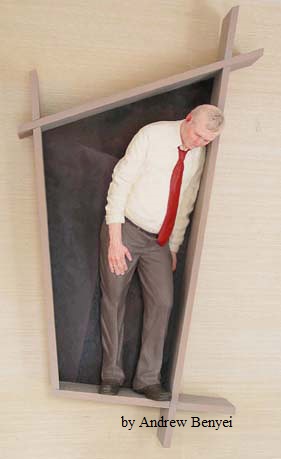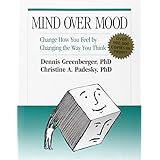
DEPRESSION is anger turned inward, anger at the self. This may be a temporary reaction to circumstances. Or it may be a set of long-standing mind habits. Depression destroys the joy of life.
Chronic depression makes a person lose hope and stop trying. Sleep may take over. Eating may change. You avoid friends. Your world shrinks. You feel like a failure, a disappointment to others and to yourself. Depression can cripple you.
Hopelessness may stem from mental assumptions run amok. Old mind habits can trap a person, perhaps in self-criticism. Current difficult circumstances may be interpreted as “my fault” when actually there are many causes.
First, can you change the situation? You may not succeed initially; but the effort will energize you. It may lead to other actions. or to arenas where you have more options. You may learn something new. You will feel more alive. You may get more involved with other people and with daily life.
One well-tested approach to conquor depression is Cognitive Behavioral Therapy. CBT and its’ offshoots suggest that you change your actions or your thoughts. Your feelings will change in response.
First, observe yourself and learn when and how you are triggered. Then you try different actions or different thinking. Preferably you practice daily. Examples of CBT could be writing out more “realistic” versions of events. Or you might consider how you would advise a friend in similar trouble.
Mindfulness is another approach in depression counselling. It grew from the principles and practices of Buddhism. It may include that old staple of the nineteen seventies, meditation. Mindfulness and its derivatives help you to notice and accept the physical and mental symptoms of your feelings. You gain time to calm your emotions and think more objectively.
Any or all of these different mental approaches can help you to break out of your automatic, self-critical pattern. A trusted counselor can dialogue with you to help you find what works for you.
Basic self-care is important. Why handicap yourself with poor nutrition or lack of sleep? Exercise of any sort releases helpful chemicals in the body. A daily routine is also reassuring. Try to get up and go to bed at the same time. Eat regular, healthy meals.
Medication is another possibility to help you kick-start change. You need a physician to prescribe medication.
Depression’s isolation leaves the mind to ruminate on troubles. Get involved with people who are meaningful to you. Chose friends who appreciate your company, and give back. Do something with or for someone else. Your own situation will seem less overwhelming. You can conquor depression and build hope.
RESOURCES
- Feeling Good, by David D. Burns
- Full Catastrophe Living, by Jon Kabat Zinn
- I Don’t Want to Talk About It . . Male Depression, by Terrence Real
- Keys to Unlocking Depression, by Michael Yapko
- Mind Over Mood, a workbook, by Christine Padesky & Dennis Greenberger
- Stop Overreacting, by Judith P. Siegel
- The Mindful Way through Depression, by Williams, Teasdale, Segal, Kabat-Zinn
- The Noonday Demons: an Atlas of Depression, by Andrew Solomon
- The Power of Vulnerability, Brune’ Brown, youtube.com
- Canadian Coalition for Seniors’ Mental Health, depression/resources-older-adults-care-partners/
- Canadian Mental Health Association (CMHA), mentalhealthhelpline.ca/
- Niagara Health Services, Adult Outpatient Mental Health, group therapy
- Niagara Region Public Health, Mental Health, health_wellness/mentalhealth
- St Joseph’s Hospital, Hamilton, Mood Disorders Clinic, connect outpatient-programs





